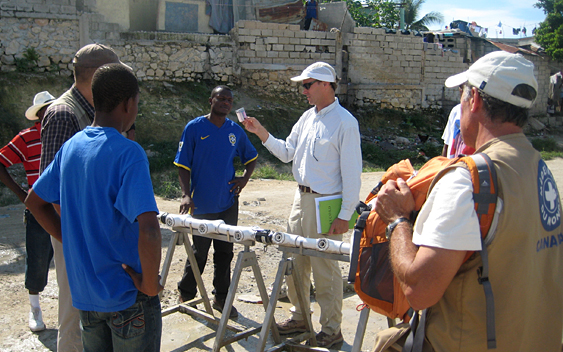PROTECTING GLOBAL ASSETS: A CONVERSATION BETWEEN GE AND CDC
Q&A with CDC's Dr. Jordan Tappero
How does CDC help other countries prepare for, and respond to, threats that impact global health security?
CDC has been working in countries around the world for decades. Many of CDC’s activities began in response to the HIV/AIDS pandemic, which still places a tremendous burden on countries. From the strength of these programs in more than 60 countries, we have found ways to extend our efforts to strengthen a country’s ability to address other health threats. These efforts include establishing surveillance systems that can quickly determine if a health issue is getting worse, to training laboratory staff not only on testing for known pathogens, but also discovering new ones. CDC supports 10 regional Global Disease Detection (GDD) Centers that work with ministries of health and other partners to improve disease surveillance, and respond to disease outbreaks. One of the programs within the GDD Centers is the Field Epidemiology Training Program (FETP). FETP helps countries build sustainable capacity for detecting and responding to health threats and develop expertise so disease outbreaks can be detected locally and prevented from spreading. These field (or applied) epidemiology training programs are modeled after CDC’s Epidemic Intelligence Service. FETPs provide actionable information so public health workers can use science and data to detect and monitor disease outbreaks and determine public health policy and programming. CDC has helped establish 50 FETPs that have trained more than 2,800 graduates from 69 countries. Approximately 80 percent of graduates work in government in their home countries and many fill leadership positions in the public health systems.
 How are CDC and other organizations working together to ensure a safer, healthier world?
How are CDC and other organizations working together to ensure a safer, healthier world?
CDC has very close ties with the World Health Organization (WHO) including its regional and country offices. WHO is an important partner to strengthening health security by helping nations build the capacity to prevent diseases wherever possible, detect infectious disease threats early and respond quickly and effectively. On February 13, 2014, WHO along with other U.S. government agencies and nearly 30 countries from around the world participated and pledged their support to the Global Health Security Agenda (GHS). Under the GHS Agenda, CDC will help countries in their efforts to attain WHO compliance with International Health Regulations and further reduce global infectious disease threats.
What keeps you up at night—and how can we all work to mitigate it?
There is now a global consensus that we have threats from new infections, resistant infection, and the potential for the intentional creation of new microbes. We also have new opportunities, including a stronger global commitment, new technologies and successes to build on. We can take advantage of these opportunities to meet challenges posed by infectious diseases and other threats by focusing our attention on three fronts. We need to build capacity to prevent diseases and avoidable catastrophes wherever possible. We need to detect threats earlier, and we need to respond effectively to infectious diseases or other threats.
Over the next five years the U.S. government is committed to working with approximately 30 partner countries, representing approximately
What steps can businesses take to protect their employees around the globe?
Businesses play a very important role not only in the expertise they can bring to public health but also in the protection of their staff and families around the world. First, employees and their family members should be vaccinated for disease threats where they are living and working. Measles is one of the most infectious diseases in the world. It is also very preventable through vaccination. Employees should also practice good hygiene to help prevent the spread of diseases. Hand washing, staying home when you are sick and covering your cough are all practices that can have a huge impact for businesses. We also recommend that businesses take the time to learn the health situation in the countries where they work. There are many information sources online, including CDC and the World Health Organization, that can provide a very detailed picture of public health in a country to better understand the threats. Countries around the globe will be more successful in trade when they can ensure that their workforce is safe when engaged in business anywhere in the world. Businesses also have an opportunity to work with government in the countries where they operate to encourage strengthening of public health systems.